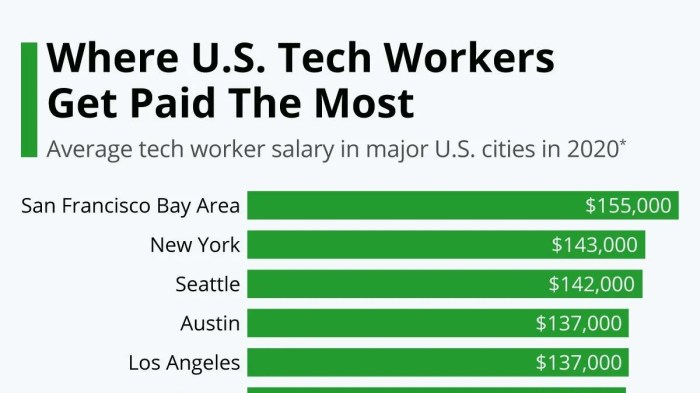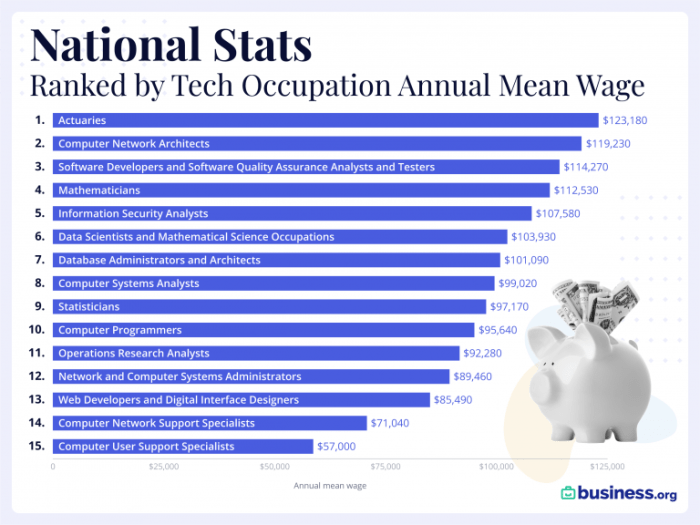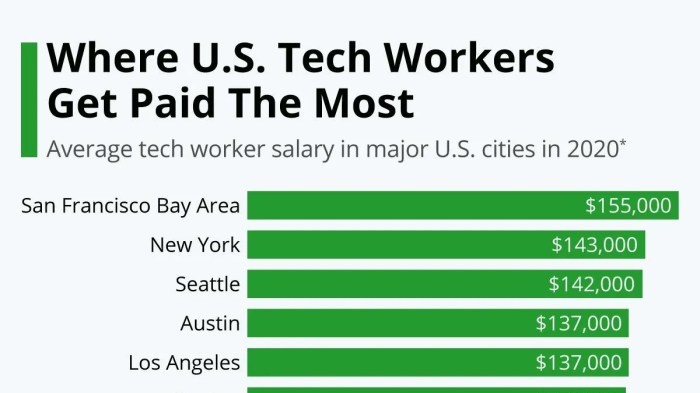
Tech Jobs Salaries US: A Comprehensive Guide
Tech Jobs Salaries US: A Comprehensive Guide takes center stage, offering a glimpse into the dynamic landscape of tech salaries in the United States. This guide delves into the factors that shape compensation, from industry trends and in-demand roles to the impact of automation and AI.
Whether you’re a seasoned tech professional or just starting your journey, understanding the intricacies of tech salaries is crucial for career success.
We’ll explore average salaries for various tech roles, highlighting regional variations and the key factors that influence compensation. We’ll also delve into industry-specific salary data, compensation packages, and the essential skills and certifications that can boost your earning potential. Prepare to navigate the job search process with confidence, armed with insights on crafting compelling resumes, preparing for interviews, and negotiating salary expectations.
Tech Job Market Overview
The US tech job market remains robust, driven by continuous innovation and the increasing digitalization of various industries. This translates to substantial growth opportunities for tech professionals, with several key sectors leading the charge.
Growth Trends and Key Industries
The tech industry in the US continues to expand rapidly, creating a high demand for skilled professionals. The Bureau of Labor Statistics projects that employment in computer and information technology occupations will grow by 13% from 2020 to 2030, much faster than the average for all occupations.
Several key industries are driving this growth:
- Software Development:The demand for software developers remains high across various sectors, including e-commerce, healthcare, finance, and entertainment. This growth is fueled by the increasing reliance on software applications and the constant development of new technologies.
- Cloud Computing:Cloud computing has become a dominant force in the tech landscape, leading to a surge in demand for cloud engineers, architects, and security specialists. As businesses continue to adopt cloud-based solutions, this trend is expected to continue.
- Data Science and Analytics:The exponential growth of data has created a high demand for data scientists, analysts, and engineers. Businesses are increasingly relying on data-driven insights to make informed decisions, optimize operations, and develop new products and services.
- Cybersecurity:As cyber threats become more sophisticated, the need for cybersecurity professionals has grown significantly. This includes roles like security analysts, penetration testers, and ethical hackers, all crucial in protecting sensitive data and systems.
- Artificial Intelligence (AI):AI is rapidly transforming various industries, creating a demand for AI engineers, machine learning specialists, and data scientists with AI expertise. The development and implementation of AI-powered solutions are driving this growth.
Most In-Demand Tech Roles
Several tech roles are consistently in high demand across various industries. These roles are often associated with emerging technologies and the need for specialized skills:
- Software Engineer:This role encompasses a wide range of responsibilities, including designing, developing, and maintaining software applications. Software engineers are highly sought after in various industries, from e-commerce to healthcare.
- Data Scientist:Data scientists analyze large datasets to extract meaningful insights and solve complex business problems. They use statistical modeling, machine learning, and data visualization techniques to drive data-driven decision-making.
- Cloud Engineer:Cloud engineers are responsible for designing, implementing, and managing cloud infrastructure and applications. They ensure the availability, security, and performance of cloud-based services.
- Cybersecurity Analyst:Cybersecurity analysts protect computer systems and networks from cyber threats. They identify vulnerabilities, implement security measures, and respond to security incidents.
- DevOps Engineer:DevOps engineers bridge the gap between software development and IT operations. They automate processes, improve collaboration, and ensure the efficient delivery of software applications.
- Full-Stack Developer:Full-stack developers possess expertise in both front-end and back-end development, enabling them to build complete web applications from scratch.
Impact of Automation and AI on Tech Jobs
Automation and AI are transforming the tech industry, impacting the demand for certain roles and creating new opportunities. While some tasks are becoming automated, this also creates a demand for professionals who can design, implement, and manage these automated systems.
“Automation and AI are not replacing jobs; they are changing the nature of work.”
Tech jobs in the US are booming, and with that comes a fierce competition for talent. It’s a good time to be a programmer or software engineer, but it’s also a time to be aware of the trends shaping the industry.
One trend I’m keeping an eye on is the upcoming adaptation of William Gibson’s cyberpunk classic Neuromancer, which is set to premiere on Apple TV+. You can find out more about the show here. It’ll be interesting to see how this adaptation impacts the tech landscape, especially in terms of the jobs it inspires and the new technologies it might spark.
[Source
Tech jobs in the US offer competitive salaries, but the ever-growing threat of cyberattacks is a constant concern. It’s reassuring to see global efforts like the recent Europe malware enforcement operation taking place to combat this issue. These initiatives not only protect businesses and individuals but also contribute to the stability of the tech industry, ultimately influencing the job market and salary trends in the long run.
World Economic Forum]
- Job displacement:Some routine tasks, such as data entry and basic coding, are being automated, leading to job displacement in certain areas. However, this also creates opportunities for professionals with advanced skills in AI, machine learning, and automation.
- New job creation:Automation and AI are creating new job opportunities in fields like AI development, data science, and robotics engineering. These roles require specialized skills and knowledge in emerging technologies.
- Upskilling and reskilling:As the tech landscape evolves, professionals need to continuously upskill and reskill to adapt to changing demands. This includes acquiring new skills in AI, cloud computing, cybersecurity, and data analytics.
Salary Trends and Factors

Tech salaries in the US are highly competitive and vary widely depending on several factors. Understanding these trends and factors is crucial for both job seekers and employers in the tech industry.
Average Salaries for Tech Roles
The average salary for tech roles in the US varies depending on the specific job title, location, and experience level. Here are some examples of average salaries for common tech roles:
- Software Engineer: $110,140 per year
- Data Scientist: $122,850 per year
- Product Manager: $130,000 per year
- DevOps Engineer: $118,750 per year
- UX Designer: $95,000 per year
Regional Variations in Tech Salaries
Tech salaries are significantly influenced by location. Major tech hubs like San Francisco, Seattle, and New York City typically offer higher salaries compared to other parts of the country. This is due to the high demand for tech talent in these areas and the higher cost of living.
- San Francisco Bay Area: Salaries are generally 15-20% higher than the national average.
- Seattle: Salaries are about 10-15% higher than the national average.
- New York City: Salaries are about 5-10% higher than the national average.
Factors Influencing Tech Job Salaries
Several factors influence tech job salaries, including:
- Experience: More experience generally leads to higher salaries. Entry-level positions typically offer lower salaries compared to mid-level and senior-level positions.
- Education: A bachelor’s degree in computer science or a related field is typically required for most tech roles. Advanced degrees like a master’s or PhD can further increase earning potential.
- Location: As mentioned earlier, salaries vary significantly based on location. Tech hubs with high demand for talent tend to offer higher salaries.
- Company Size: Larger companies generally offer higher salaries due to their larger budgets and greater resources. Startups and smaller companies may offer lower salaries but provide opportunities for rapid growth and equity.
- Skills and Expertise: Specific skills and expertise in high-demand areas like artificial intelligence, machine learning, and cybersecurity can command higher salaries.
- Company Culture and Benefits: Some companies offer competitive salaries but may have lower benefits packages, while others offer generous benefits but may have lower base salaries. It’s important to consider the overall compensation package when evaluating job offers.
Salary Expectations for Different Experience Levels
Salary expectations vary significantly depending on the experience level:
- Entry-Level Positions: Entry-level tech roles typically require a bachelor’s degree and 0-2 years of experience. Salaries for these positions can range from $60,000 to $90,000 per year.
- Mid-Level Positions: Mid-level tech roles require 3-5 years of experience and a strong understanding of industry best practices. Salaries for these positions can range from $90,000 to $150,000 per year.
- Senior-Level Positions: Senior-level tech roles require 5+ years of experience and a proven track record of success. Salaries for these positions can range from $150,000 to $250,000 per year or more, depending on factors like leadership responsibilities and company size.
Industry-Specific Salary Data
Understanding how salaries vary across different industries is crucial for tech professionals seeking to maximize their earning potential. This section explores average salaries for popular tech roles in various sectors, providing insights into the factors influencing these variations.
Salary Differences Across Industries
Salary discrepancies across industries can be attributed to a multitude of factors, including:
- Industry Size and Growth:Larger and faster-growing industries often have greater demand for tech talent, leading to higher salaries. For instance, the tech industry itself, with its rapid innovation and expansion, consistently offers competitive salaries.
- Industry Profitability:Profitable industries typically have more resources to invest in employee compensation, including higher salaries for tech professionals.
- Industry Complexity and Technical Requirements:Industries requiring specialized tech skills or complex systems often offer higher salaries to attract and retain qualified talent. For example, financial technology (FinTech) demands expertise in data security and complex algorithms, resulting in higher compensation packages.
- Geographic Location:Salaries for tech roles can vary significantly based on location, with major tech hubs like Silicon Valley and New York City generally offering higher salaries due to greater demand and competition.
- Company Size and Stage:Larger, established companies often have more mature compensation structures and may offer higher salaries compared to smaller startups or early-stage companies.
Average Salaries by Industry and Role
The following table showcases average salaries for popular tech roles across various industries. It’s important to note that these are general averages and actual salaries can vary based on factors such as experience, skills, location, and company size.
| Industry | Role | Average Salary | Salary Range |
|---|---|---|---|
| Software Development | Software Engineer | $110,000 | $80,000
|
| Data Science | Data Scientist | $120,000 | $90,000
|
| Cybersecurity | Security Engineer | $105,000 | $75,000
|
| Finance | Quantitative Analyst (Quant) | $130,000 | $100,000
|
| Healthcare | Bioinformatician | $95,000 | $70,000
|
| E-commerce | Web Developer | $90,000 | $65,000
|
Compensation and Benefits
Tech jobs in the US are known for their competitive compensation packages, which go beyond just a base salary. These packages are designed to attract and retain top talent, and they often include a combination of base salary, bonuses, stock options, and comprehensive benefits.
Tech jobs in the US are booming, and with that comes the need for innovative solutions. Apple has just addressed a major headache for Vision Pro users by patching a critical issue in VisionOS 11 beta, allowing users to reset their passwords without a trip to the Apple Store.
This change is a welcome improvement for anyone working in the tech industry and needing a reliable device. As the tech landscape continues to evolve, we can expect to see even more advancements in the future, which could drive even higher salaries for skilled professionals.
Compensation Breakdown
The typical compensation package for a tech job in the US can vary widely depending on factors such as experience, location, company size, and the specific role. However, the following components are commonly found:
- Base Salary:This is the primary component of compensation and is usually paid bi-weekly or monthly. The base salary for tech jobs can range from $50,000 to $200,000 or more per year, depending on the factors mentioned above.
- Bonuses:Many tech companies offer performance-based bonuses, which are typically paid out annually or semi-annually. Bonuses can be a significant portion of an employee’s total compensation, and they can be based on individual performance, team performance, or company-wide performance.
- Stock Options:Stock options give employees the right to purchase shares of the company’s stock at a predetermined price, often at a discounted rate. Stock options can be a valuable form of compensation, especially for employees who work at companies that are growing rapidly.
Negotiating Salary and Benefits
Negotiating salary and benefits is an important part of the job search process, and it can be a daunting task for many job seekers. Here are some tips for successful negotiation:
- Research:Before entering any negotiations, it is crucial to research the average salary and benefits for similar roles in your location. This will give you a good idea of what to expect and help you make a strong case for your desired compensation.
- Be Prepared:Have a clear understanding of your own skills, experience, and value proposition. Be prepared to articulate why you are a valuable asset to the company and why you deserve the compensation you are requesting.
- Be Confident:Confidence is key when negotiating. Be assertive but respectful, and be prepared to walk away if you are not offered a fair deal. Remember, you are in control of your own career and you deserve to be compensated fairly for your contributions.
Attractive Benefits Packages
Tech companies are known for offering some of the most comprehensive and generous benefits packages in the industry. Here are some examples of attractive benefits that tech companies often provide:
- Health Insurance:Most tech companies offer comprehensive health insurance plans, including medical, dental, and vision coverage. Some companies also offer health savings accounts (HSAs) or flexible spending accounts (FSAs) to help employees save on healthcare costs.
- Paid Time Off:Tech companies typically offer generous paid time off (PTO) policies, including vacation time, sick leave, and personal days. Some companies also offer unlimited PTO, which allows employees to take as much time off as they need, as long as their work is getting done.
- Parental Leave:Tech companies are increasingly offering extended parental leave policies, both for mothers and fathers. These policies can range from several weeks to several months, and they are designed to help employees balance their work and family life.
- Retirement Savings:Tech companies often offer 401(k) plans, which allow employees to save for retirement. Many companies also offer matching contributions, which means they will contribute a certain amount to your 401(k) account for every dollar you contribute.
- Tuition Reimbursement:Some tech companies offer tuition reimbursement programs to help employees pay for continuing education. This can be a valuable benefit for employees who are looking to advance their careers or learn new skills.
- Employee Perks:Many tech companies offer a variety of employee perks, such as free food and drinks, on-site gyms, commuter benefits, and employee discounts. These perks can make a big difference in employee satisfaction and retention.
Skills and Certifications: Tech Jobs Salaries Us
In the dynamic tech landscape, possessing the right skills and certifications is crucial for career advancement and salary negotiation. Employers often prioritize candidates who demonstrate proficiency in specific technologies and possess relevant credentials. This section explores the essential skills and certifications for various tech roles and how acquiring them can impact your earning potential.
Impact of Skills and Certifications on Salary Potential
Earning a specific certification or developing a highly sought-after skill can significantly enhance your salary prospects. For instance, according to a recent study by the Indeed Hiring Lab, software engineers with AWS certifications earn an average of 10% more than their counterparts without such credentials.
This trend extends across various tech roles, with certifications often acting as a proxy for demonstrable expertise and contributing to higher compensation packages.
Essential Skills and Certifications for Different Tech Roles, Tech jobs salaries us
Here’s a breakdown of essential skills and certifications for some popular tech roles:
Software Engineering
- Programming Languages:Python, Java, JavaScript, C++, C#, Go, Ruby, Swift, Kotlin
- Frameworks and Libraries:React, Angular, Vue.js, Spring Boot, Django, Node.js, TensorFlow, PyTorch
- Databases:SQL, NoSQL (MongoDB, Cassandra, Redis)
- Cloud Computing:AWS, Azure, GCP
- Certifications:AWS Certified Developer – Associate, Azure Developer Associate, Google Cloud Professional Cloud Architect
Data Science
- Programming Languages:Python, R, SQL
- Machine Learning Algorithms:Linear Regression, Logistic Regression, Decision Trees, Random Forests, Support Vector Machines, Neural Networks
- Data Visualization Tools:Tableau, Power BI, matplotlib, seaborn
- Big Data Technologies:Hadoop, Spark, Hive
- Certifications:AWS Certified Machine Learning – Specialty, Azure Data Scientist Associate, Google Cloud Professional Data Engineer
Cybersecurity
- Networking Fundamentals:TCP/IP, DNS, VPN, Firewalls
- Security Tools:Nmap, Wireshark, Metasploit
- Ethical Hacking Techniques:Penetration Testing, Vulnerability Scanning
- Security Standards and Frameworks:ISO 27001, NIST Cybersecurity Framework
- Certifications:CompTIA Security+, Certified Ethical Hacker (CEH), Certified Information Systems Security Professional (CISSP)
Resources for Skill Enhancement and Certification
- Online Learning Platforms:Coursera, Udemy, edX, Udacity, Khan Academy
- Professional Organizations:IEEE, ACM, ISC 2
- Vendor-Specific Training Programs:AWS Training, Microsoft Learn, Google Cloud Training
- Bootcamps:General Assembly, Flatiron School, Coding Dojo
Job Search Strategies
Landing a tech job in the US requires a strategic approach. The market is competitive, but with the right tools and techniques, you can increase your chances of success. This section will explore effective strategies for finding tech jobs, crafting compelling resumes and cover letters, and navigating the interview process.
Online Job Boards
Online job boards are a valuable resource for tech job seekers. They provide a centralized platform for employers to post open positions and for candidates to search and apply.
- Indeed:Indeed is a popular job board with a vast database of tech jobs across the US. It allows you to filter by location, experience level, and other criteria.
- LinkedIn:LinkedIn is a professional networking site that also serves as a job board. It allows you to connect with recruiters and employers, and view job postings from companies you are interested in.
- Glassdoor:Glassdoor is a website that provides insights into company culture, salaries, and interview experiences. It also features a job board with listings from various companies.
- Dice:Dice is a specialized job board that focuses on tech roles. It features a wide range of tech jobs, from software engineering to data science.
Networking
Networking is crucial in the tech industry. Building relationships with professionals in your field can open doors to job opportunities.
- Attend industry events:Conferences, meetups, and workshops are excellent opportunities to connect with other tech professionals.
- Join professional organizations:Organizations like the Association for Computing Machinery (ACM) and the Institute of Electrical and Electronics Engineers (IEEE) provide networking opportunities and access to industry resources.
- Reach out to your network:Leverage your existing network of friends, family, and former colleagues to learn about potential job openings.
Crafting a Compelling Resume and Cover Letter
Your resume and cover letter are your first impression on potential employers. They should highlight your skills and experience in a clear and concise manner.
- Tailor your resume to each job application:Customize your resume to match the specific requirements of each job posting.
- Quantify your achievements:Use numbers and data to demonstrate the impact of your work. For example, instead of saying “Increased website traffic,” say “Increased website traffic by 20%.”
- Use s:Include relevant s from the job description in your resume and cover letter. This will help your application stand out in applicant tracking systems (ATS).
- Highlight your skills and experience:Focus on your most relevant skills and experience, and provide specific examples of how you have used them in previous roles.
- Proofread carefully:Ensure your resume and cover letter are free of grammatical errors and typos.
Preparing for Interviews
Preparation is key to a successful interview. Research the company and the role, and practice answering common interview questions.
- Research the company:Learn about the company’s mission, values, and recent news.
- Prepare for common interview questions:Practice answering common interview questions, such as “Tell me about yourself” and “Why are you interested in this role?”
- Prepare your own questions:Ask insightful questions about the company, the role, and the team. This demonstrates your interest and engagement.
- Practice your communication skills:Practice communicating your ideas clearly and concisely.
Negotiating Salary Expectations
Negotiating salary is an important part of the job search process. Be prepared to discuss your salary expectations and justify your request.
- Research industry benchmarks:Use online resources like Glassdoor and Salary.com to research average salaries for similar roles in your location.
- Highlight your value:Emphasize your skills, experience, and achievements that make you a valuable asset to the company.
- Be confident and assertive:Negotiate with confidence and be prepared to walk away if the offer is not acceptable.
Future Outlook

The tech industry is constantly evolving, driven by rapid advancements in technology and shifting consumer demands. Understanding the future outlook for tech jobs in the US is crucial for professionals seeking long-term career success.
Emerging Technologies and Industry Trends
Emerging technologies, such as artificial intelligence (AI), machine learning (ML), blockchain, and the Internet of Things (IoT), are reshaping the tech landscape and creating new opportunities. These technologies are driving innovation across various industries, leading to increased demand for skilled professionals in these areas.
“The future of work is about leveraging technology to enhance human capabilities and create new opportunities.”
World Economic Forum
Growth Areas in the Tech Sector
Several areas within the tech sector are expected to experience significant growth in the coming years, creating high-demand jobs with competitive salaries.
AI and Machine Learning
AI and ML are transforming industries, from healthcare and finance to retail and transportation. The demand for professionals with expertise in AI algorithms, data analysis, and ML model development is rapidly increasing. Salaries for AI and ML professionals are among the highest in the tech industry.
Cybersecurity
As businesses increasingly rely on technology, the threat of cyberattacks is growing. Cybersecurity professionals are essential for protecting sensitive data and ensuring business continuity. The demand for cybersecurity experts is high, and salaries are expected to continue to rise.
Cloud Computing
Cloud computing is becoming increasingly popular as businesses seek cost-effective and scalable solutions. Cloud computing professionals with expertise in cloud infrastructure, security, and application development are in high demand. Salaries for cloud computing professionals are competitive and are expected to grow as the cloud market expands.
Data Science and Analytics
Data is becoming a valuable asset for businesses, and data science professionals are needed to extract insights from vast datasets. The demand for data scientists with expertise in data analysis, statistical modeling, and machine learning is increasing rapidly. Salaries for data science professionals are high and are expected to remain competitive.
Adapting to Future Changes
To thrive in the evolving tech job market, professionals need to be adaptable and proactive in developing new skills and knowledge.
Continuous Learning
The tech industry is constantly changing, so continuous learning is essential. Professionals should stay up-to-date on the latest technologies and trends through online courses, workshops, and industry conferences.
Developing In-Demand Skills
Focusing on developing in-demand skills, such as AI, cybersecurity, cloud computing, and data science, can enhance career prospects and salary potential.
Networking and Building Relationships
Networking with industry professionals can provide valuable insights, job opportunities, and mentorship. Attending industry events, joining professional organizations, and connecting with colleagues on LinkedIn are effective ways to build a professional network.







